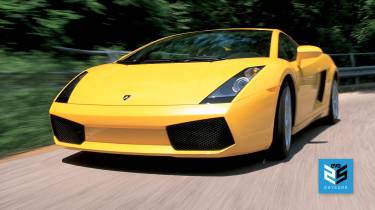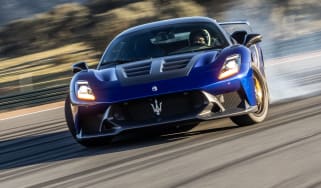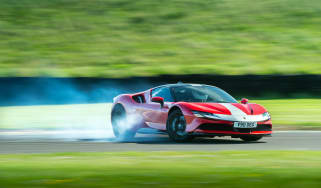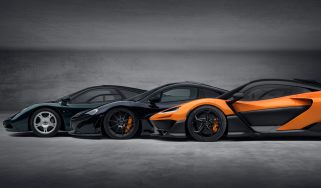Lamborghini Gallardo (2003 - 2013): review, history and buying guide
The Gallardo was the car that catapulted Lamborghini into the modern age, making it one of our top 25 cars of the last 25 years
Until the Gallardo appeared on the scene in 2003, Lamborghini hadn’t built an entry-level model since the Jalpa, which ceased production in 1988. You either had the bunce to buy a Diablo or a Murciélago, or you caught the bus to Maranello and sheepishly enquired about a 360 Modena or F430.
To this day I rather like that old-school, unequivocal, la dolce vita approach to making supercars. I also love the string of obscure V8-engined baby Lambos that sold in their handfuls throughout the ’70s and ’80s, but it’s impossible to overstate the significance of successfully bringing the Gallardo to market. Urus aside, it defines the Audi-owned era and defies the fears of those who felt the union would never work.
> Lamborghini Aventador Ultimae v Lamborghini Countach
The Gallardo was more attainable. Thoroughly developed. Commercially sound. And, perhaps most surprisingly, still an unabashed Ferrari-eater. Packing a 5-litre V10, fancy aluminium construction and a razor-sharp design by Luc Donckerwolke, it was and remains a stunning piece of work.
It’s worth recalling that this was the era of pre-credit crunch ‘cheap’ money. It’s no coincidence that brands such as Aston Martin and Bentley also launched affordable cars around this time, the (just) sub-£80k Vantage and similarly priced Conti GT being the poster cars for once aristocratic marques embracing enthusiasts who had previously only dreamed of owning such elite and exotic metal.
Born from the V10-engined Lamborghini Cala concept car proposed by Giugiaro (a car I was fortunate to drive back in 1995), the Gallardo was a sharp kick up the culo for sworn enemy Ferrari, who was still fielding the ageing and perennially rather limp 360 Modena when the new Lambo arrived.
Its advantage was clear. Better looking, blessed with two more cylinders and 1.4 litres of additional swept volume yielding a 100bhp and 100lb ft advantage, the Gallardo was a blockbuster. evo was well established by the time it was launched, but it still felt special to be amongst the first to drive what was clearly going to be a transformational car for Lamborghini. It speaks volumes that whenever I see one – or worse, see one for sale – the Gallardo still has star quality.
All that said, it wasn’t perfect. All-wheel drive made it less expressive through a corner than the equivalent Ferrari (something Lamborghini would eventually acknowledge with the rear-wheel-drive Balboni edition) but, with two decades of perspective, any slight lack of delicacy and dynamic sparkle is amply compensated for by its raw hold of the road, powertrain drama and all-round effectiveness.
Reacquaintance with the original 5-litre engine serves to remind that it’s a very different beast to the 5.2-litre Audi-developed motor that followed. These days, 500bhp might seem like relatively small beer, but back in 2003 it was major-league power. Coupled to a choice of single-clutch e‑gear paddleshift or regular stick-shift gearbox, the Gallardo was a car conceived and sold on the cusp of major technological change.
Compared with the way current supercars are torque-vectored to within an inch of their lives, the early Gallardo feels less three-dimensional in terms of handling and steering response, but its lack of weight, incendiary naturally aspirated engine, hydraulic power steering and absence of contrived dynamic modes lends it a simplicity and honesty that’s hugely refreshing.
We drove the e-gear car on the launch, mainly to judge it against our experience of Ferrari’s F1 transmission. It stood comparison well but, as with those early Ferrari efforts, it’s the one area that now betrays the Gallardo’s age. By comparison, a manual, as driven here, might not capture the new-millennium zeitgeist of an early e‑gear car, but the driving experience is more satisfying, celebrating the union of an epic engine and an engaging gearbox in memorable style. The clutch lasts longer, too.
As the Gallardo evolved, so it matured, and in doing so lost some of the early car’s grit, the ‘pre-LP’ models possessing a sharper and more raucous character thanks to the 5-litre motor and its 7-8-5-2-1-10-9-4-6-3 firing order. The engine note is more feral, with a serrated shriek at the top end that the later, creamier-sounding 1-6-5-10-2-7-3-8-4-9 5.2-litre cars would only get close to in more extreme versions such as the Performante.
It’s a mark of the Gallardo’s success that a total of 14,022 cars were built across pre-LP and LP generations. This compares with a paltry 791 Urracos, 410 Jalpas and just 54 Silhouettes. The real killer stat is that by the time it ceased production in 2013 the Gallardo accounted for 50 per cent of all Lamborghinis built since 1963.
Dozens of different variants were built during its lifetime, from coupe and Spyder to SE, Superleggera, Balboni, Performante and Squadra Corse amongst many others. Even when facing far younger and more technologically advanced rivals such as the Ferrari 458 and McLaren 12C, the Gallardo remained a force to be reckoned with. A potent, able and intoxicating machine right to the end, it transformed Lamborghini from anachronistic throwback to contemporary contender. The rest is history.
History
The Gallardo made its debut at the Geneva motor show in 2003 before going on sale in the UK in the autumn of that year. Lamborghini’s business was instantly revolutionised; the long-awaited second model-line was an instant hit and the perfect complement to the recently introduced Murciélago.
Designed by Luc Donckerwolke, whose CV includes the Audi R8 Le Mans car, the Gallardo’s beautifully sculptured aluminium panels clothe an aluminium spaceframe, meaning the car is both light and exceptionally stiff. And being shorter than a 911, it’s compact too, improving nimbleness and usability.
Mated to either a six-speed manual or ‘e-gear’ paddle-shift gearbox, the mid-mounted 5-litre, 90-degree V10 develops around 500 bellowing horses, transmitted to the tarmac through four-wheel drive. In normal conditions 70 per cent of that power is delivered through the rear wheels, although up to 50 per cent can be sent to the fronts when required. Self-adjusting Koni dampers and eight-pot Brembo brakes help keep everything in check.
The car remained essentially the same until the the limited-production (250 cars only) SE arrived in September 2005, with a 20bhp power hike (up from 493bhp to 513bhp), shorter gear ratios, sports suspension and a smattering of cosmetic revisions. It may be difficult to find one of these for sale, but the standard 2006 model-year car incorporated most of these features, including the power increase and shorter-ratio gearbox. Alongside the MY06 car came the Spyder, costing £131,000.
Buying guide
It’s unlikely that you will be looking at a car that has not been appropriately serviced by an authorised Lamborghini dealer, but if you are looking at a left-hand-drive car, examine the paperwork closely. UK Gallardos get a three-year warranty, but privately imported cars are only covered for two years. However, customers who have made claims have reported that their issues have been rectified with the minimum of fuss.
Engine
Loosely based on the architecture of Audi’s 4.2 V8, the Gallardo’s V10 unit features bespoke conrods and pistons, and cylinder heads designed by Lamborghini and Cosworth Engineering. The result is a well engineered, strong engine, and failures are a real rarity.
The biggest issue is the oil level, or rather the correct checking of the oil level. Oil consumption should be minimal, and although the handbook quotes the possibility of a litre being consumed every 600 miles, a litre every 4000 miles is more usual. However, several owners (presumably unfamiliar with the intricacies of dry-sump lubrication) have ignored the instructions in the owner’s handbook when checking it and have overfilled it, which inevitably leads to an unscheduled dealer visit.
On the subject of lubricant, it’s absolutely vital that Agip oil is used. There have been several dealer-reported failures where engines (both for the Gallardo and Murciélago) have suffered catastrophic failures as a result of using cheaper alternatives. A new Gallardo engine costs around 60,000 Euros…
The only other thing to look out for is ‘hunting’ from the engine, usually signifying that the throttle bodies are sticking slightly. This can affect cars that have been regularly used in slow traffic, and although it is easily remedied with a simple clean-up, it’s a job best left to a dealer technician.
Exhaust
The same exhaust system is fitted to ’03-’05 cars and incorporates ‘noise reduction valves’. These two valves keep the engine relatively quiet at noise-test speeds, but allow for a louder note above 4000rpm. As the valve is active, a permanently quiet exhaust note may suggest a problem with the solenoid, although thus far no failures have been heard of.
Some cars may have been fitted with aftermarket sports exhausts, with Tubi and Larini the preferred choices. The fitment of these can sometimes lead to loose, rattling heat-shields, but it’s an easily resolved problem. The limited-edition SE Gallardo had a much less restrictive exhaust and is loud at all times.
Gearbox/clutch
The gearbox is immensely strong irrespective of whether you want the cable-operated manual or the e-gear paddle-shift. At high mileages the cable on the manual ’box may start to stretch slightly, but this is unlikely to affect even the earliest Gallardos just yet. Otherwise the manual has no known vices.
The e-gear system has three modes of operation: a normal mode, a faster and harder-hitting sport mode, and a fully automatic mode. There is also a setting for low-friction surfaces such as snow and ice.
One particular advantage of the e-gear system is that it can be easily examined by a main-dealer technician before you make your purchase. By connecting a laptop he can determine whether the clutch has had a hard life and let you know how much wear is left. This is a strongly advised course of action and may save an awful lot of worry when purchasing. Several different software upgrades were available for e-gear, as the system has benefited from continuous development. A jerky gearchange may simply indicate an early program is still in use.
As with many supercars past and present, the clutch is a potential weak point. Anyone considering a pre-owned supercar should be thinking about clutches, and the Gallardo is no exception. Early Gallardos were fitted with what is now known as the ‘A’ clutch, and some of these – though by no means all of them – proved to be extremely fragile. The ‘B’ clutch came and went rapidly, then for ’05 the ‘C’ iteration arrived, proving to be very durable. Tales of lifespans in excess of 20,000 miles are not uncommon, but don’t forget that this is a 500bhp, four-wheel-drive supercar, and clutches can be destroyed almost instantly with abuse. The latest and best clutch design is designated ‘E’ and is fitted in place of worn ‘A’, ‘B’ and ‘C’ clutches. MY06 manual cars have a sintered type of clutch. Gallardo transmissions are sited behind the engine, so clutch replacement does not require removal of the engine.
Electrical
Some early Gallardos were prone to water ingress to the spark plugs. Lamborghini’s customer care programme installed additional bungs to the camshaft covers to cure this, and all early cars should have had this modification done by now.The Gallardo has virtually every electronic gizmo and creature comfort you can imagine. No specific problems exist, but all should be working perfectly.
Suspension
Koni’s Frequency Sensitive Dampers (FSD) are fitted to the Gallardo and should give no cause for concern. UK cars were available with a ‘lifting system’ option (August ’05 cars onwards) to allow the front ground clearance to be raised by 30mm where necessary. If this system is fitted but not used regularly, oil leakage and system failure can occur, although this won’t affect the performance of the suspension, which is on a separate hydraulic circuit. A simple inspection and test should suffice.
Some cars had front and rear anti-roll bar bush problems, but these were part of an ongoing customer care campaign and should have been replaced by a dealer free of charge.
Wheels/tyres
Gallardos came with Pirelli P Zero Rossos as standard (the SE came with P Zero Corsas). Tyre wear varies depending on use; for a car exercised but not abused you should expect between 5000 and 8000 miles from the rears (295/30 ZR19) and double that from the fronts (235/35 ZR19). Budget £550 for a pair of fitted rear tyres, but shop around as prices and availability vary enormously.
The 19in wheels are extremely easy to damage, as the tyres are very low profile and so do not protrude beyond the rims. Kerbed alloys are therefore a common sight. Budget £100 plus VAT to have a wheel refurbished by a dealer (although a good independent wheel repairer can often do it for less than half that price).
Brakes
The Gallardo’s brakes are massive: 365mm vented discs gripped by huge eight-piston callipers on the front, 335mm vented discs with four-piston callipers on the back. The rear discs also accommodate separate handbrake callipers. The handbrake is notoriously unreliable and the best advice is to leave a Gallardo in gear – it’s even recommended in the handbook.
Some owners have experienced brake fade in the most extreme of conditions (like track work), but on the road you will not have a problem. Despite the power being reined in, the brake discs and pads are very durable.
Bodywork
Its all-aluminium body means a Gallardo is easily damaged by small knocks that a steel shell would cheerfully shrug off. There have also been a few reports of corrosion at the inner upper and lower seams of the side oil-cooler vents.Front and rear bumpers are plastic and colour-coded to the bodywork. Panel gaps should be minimal and consistent. No composite materials are used in the Gallardo’s construction.
Film-type protection is popular on these cars to protect the paintwork from stone damage. Common areas of protection include the whole of the front bumper, bottom half of the boot lid, the sills and the door mirrors. If it’s fitted, there should be no signs of the film lifting. Though not standard, most original purchasers will have been offered it as an option.
Other things to check include the first screw, on both sides, securing the under-bonnet trim panel. These have been known to come loose, resulting in the inside paint surfaces of the buttresses becoming scratched.
Interior
The quality of the Gallardo’s interior is excellent and certainly a cut above that of Lambos of old. The interior is also the most obvious sign of Audi’s supervision of Sant’Agata’s activities. Most instruments and switchgear are sourced from the Audi parts bin, and this is no bad thing. Audi’s equipment is as well screwed together as that of any premium-brand manufacturer, and equally reliable.
The dual-zone climate control is standard in all cars. It works well and should cause no problem. The area where individual cars may vary is the entertainment system. The Gallardo came with a six-CD changer as standard, but there was also the option of a satnav system with a 7in TFT display and integrated TV, radio and MP3 player. This was a £2500 option and is well worth seeking out.
All interior trim (including the dashboard and instrument binnacles) is covered in high-quality leather. The roof and sun visors are finished in Alcantara. Some cars had optional two-tone interiors, with some trim panels matched to the body colour of the car. All trim should fit perfectly and be flawless.
What we thought
'The steering is heavy at slow speeds, but start to feed the power in and it livens up just as the V10 begins to fill the cabin with its sonorous, baritone wail. The power is intense, but its delivery is smooth and linear, and it only takes a couple of flicks of the right-hand paddle for the peripheral view to become a very-high-speed blur.
There’s a sense of occasion when climbing aboard a Gallardo that I doubt would diminish even if you drove one every day for the next ten years. Yes, you can spot the Audi switchgear, but it really doesn’t matter. With its deep dash and even deeper seats, the cabin feels every inch a true Italian exotic. It’s a car to make you feel good about yourself, but with its everyday usability it’s a feeling you can enjoy on a regular basis.'







